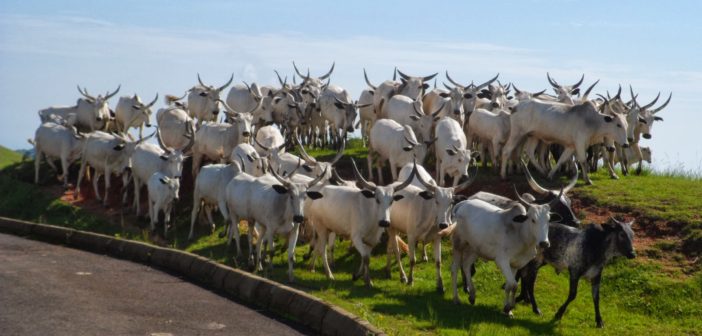The end might finally be in sight over the incessant clashes between herdsmen and farmers as the Federal Government has formulated a plan for the establishment of cattle ranches in 10 states.
The federal government and the following states- Adamawa, Benue, Ebonyi, Edo, Kaduna, Nasarawa, Oyo, Plateau, Taraba and Zamfara- in the phaze one of the national ranching project which will gulp N70 billion in the first 3 years.
This was disclosed on Tuesday by the Secretary to the National Economic Council’s National Livestock Transformation Plan, Dr. Andrew Kwasari in Abuja. He also said that N179bn would be spent over a period of 10 years on the national livestock implementation.
At the briefing with journalists on Tuesday, Kwasari said, “The National Livestock Implementation Plan is a mediation stemming from meetings and recommendations of the Federal Ministry of Agriculture and NEC in 2017 as regards state interventions following the incessant pastoralist-farmer conflicts.”
According to the plan, 10 states in pilot phase include Adamawa, Benue, Ebonyi, Edo, Kaduna, Nasarawa, Oyo, Plateau, Taraba and Zamfara. He also disclosed that the ranches will be in various sizes. “A ranch design has also been proposed in models of various sizes clustered in 94 locations in the 10 pilot states.”
Kwasari said that there would be ranch models of 30, 60, 150 and 300 cows in a location within grazing reserves. “Based on the carrying capacity of each of the model ranches above, as determined by pasture and fodder yields, land is allocated for pasture production.”
He also disclosed that the government would engage the private sector and other countries “to work with Nigerian research institutes in developing national cattle breeds for dairy and beef production over a 10 years period.
“The plan envisages cross-breeding scheme with the exotic semen of Brahman on Sokoto/Adamawa Guadli for beef cattle, while Holstein Friesian/Jersey will be used to cross-breed Bunaji.”
On financing, Kwasari said the anchor-borrower model used for farmers and other financial models will be adopted and that pastoralists must be registered and recognized as cooperatives for the purpose of the ranching scheme.
Kwasari also disclosed that Nigeria has milk deficit of 700 million liters per year which will be reduced by 200 million liters by the second year of the project and the deficit wiped out by the fourth years.
According to Kwasari, private sector investment is estimated to reach around N100 billion between the third to the tenth year.




